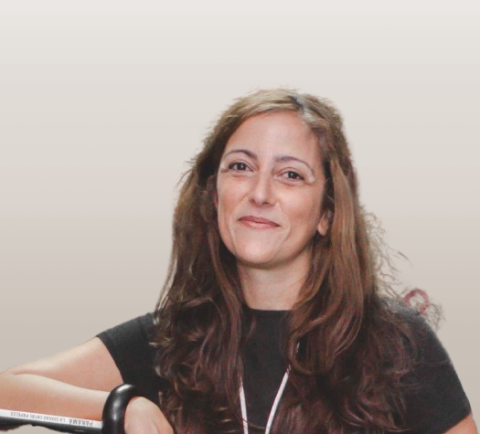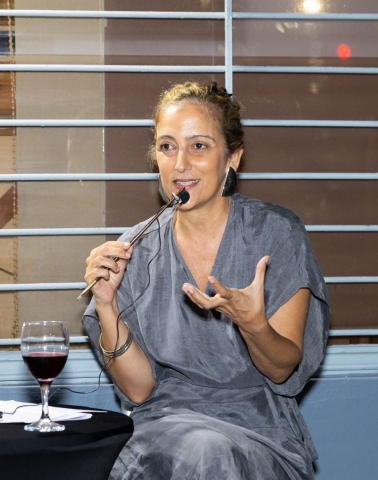
Sol Lauría is a journalist who covers governance, corruption and human rights from Panama. Participating in an ICFJ program helped her expose major corruption scandals in Panama.
“ICFJ's support for these investigations was fundamental for their realization,” Lauría said. “In a scenario of crisis and precariousness of journalism, it is increasingly difficult to allocate the time that this type of research requires for reporting, processing large volumes of data, editing and publication.”
This interview has been edited. It has also been translated from Spanish.
How have you been involved with ICFJ over the years?
In 2018, I participated in ‘Cuida tu voto,’ a project implemented by ICFJ in partnership with Connectas and the Latin American Center for Journalism (Celap) for the 2019 presidential elections. Along with two local media outlets, we published two essential platforms for decision-making: one to bring citizens information about candidates' backgrounds, conflicts of interest, and positions; and another for reporting irregularities in the electoral process.
I was also a data leader and editor of ICFJ's Investigative Journalism Initiative of the Americas in partnership with Connectas from 2013 to 2019. During those years, Connectas exposed corruption, human rights violations and money laundering in different countries of the continent.
In addition to that, I was awarded a fellowship in 2022 to investigate impunity in Panama with journalist Eliana Morales, from La Prensa.
What was the biggest outcome from participating in the program?
ICFJ's support for these investigations was fundamental for their realization. In a scenario of crisis and precariousness of journalism, it is increasingly difficult to allocate the time that this type of research requires for reporting, processing large volumes of data, editing and publication.
And specifically linked to Panama, we are in a country considered a middle-income country, so it is not the destination of a handful of grants that finance independent journalism in the region. Although it is a rich country compared to others in the region, the high rates of conflicts of interest in the corner known as “The Republic of Cousins” mean that investigative journalists truly independent of all powers are marginalized from any funding.
So, in a general assessment, and for the two reasons summarized in the previous points, the injection of funds to guarantee truly independent, rigorous, and professional investigations is fundamental.
In particular, the investigations in which I have participated have had the following results:
- Panabrecht: This project published the first interactive database of the Odebrecht case in Panama, based exclusively on the defendants in the court case and with the aim of showing the protagonists, their links and interactions. Based on this information, we published nine reports that revealed the characters, the plots and the mechanism that allowed massive corruption and embezzlement through government contracts with Odebrecht.
- Government donors club/ tourism incentives through tax credits: The investigation revealed the interests behind the sanctioning of a law on tourist incentives through tax credits in Panama, in which the government committed itself to finance up to 100% the construction of hotels of private companies, with the excuse of reactivating the economy and promoting the activity of the sector. The finding, after tracing each of the projects in databases, with requests for access to public information and other supporting documents, was that the main beneficiaries were businessmen who were friends, members, relatives or donors of the government of President Laurentino Cortizo. The public impact of this reporting in Panama was overwhelming. The day after the first piece was published, developers withdrew four projects from the race to access tourism incentives through tax credits. The president also vetoed one of the three bills approved by the Assembly and the Court declared one of them unconstitutional.

What is something impactful you have worked on since participating in an ICFJ program that you are proud of and would want to highlight?
Fundamentally, I learned all about data journalism: a great addition to tell more and better stories about corruption, money laundering and power in our region.
What kind of difficulties as a journalist have you faced in Panama? If applicable, how has ICFJ helped alleviate or support journalists with these difficulties?
The main problem, in the case of truly independent projects, is sustainability. Financing initiatives of this type becomes a supreme difficulty, because it is a small country, where the great majority of elites have interests in several areas and are inside the governments. For examples, the three investigations cited: lawyers who are part of the government and are partners of large firms, opened companies used by Chavismo to hide or launder money outside Venezuela and also to pay bribes from Odebrecht. None of them would want this to be published and they have less than three degrees of separation with possible financiers of these projects.
Therefore, the support with amounts from international organizations such as ICFJ is very fundamental.
What’s the most impactful/meaningful story that you’ve worked on in your career?
All of them are powerful for me. Or because they managed to bring justice to victims of human rights violations, like Duelo; to reveal hidden files, like Panama Files; to expose the ways and scope of corruption, like Panabrecht or Chavismo Inc. Not to mention the Panama Papers, a milestone in my career and in global journalism.